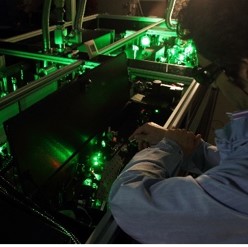ICFO decide game
Group 1 – Participant 2
Story cards
Read all the cards from this category, choose the one that looks more interesting to you and explain it to the rest of the group.
clara caballero
Story Card 4
We couldn’t understand modern medicine without photons as a tool to diagnose and treat patients. In the hospital where I work as a physician, thanks to the optical fibers of endoscopes, we can access places hidden inside the bodies of our patients without the need for invasive procedures. Various sensors and imaging techniques allow us to see and obtain information from within the bodies to be able to diagnose more accurately. In recent years, lasers have become an essential tool in many operating rooms for extreme precision surgery. And we haven’t even started talking about the therapies that nanophotonics enables!
health
Jun jiang
Story Card 6
I wore glasses since I was a kid and I always wanted to be like my friends who could play sports and go to the pool without having sight problems. Two years ago I was able to have eye surgery to reduce my myopia and I can finally see the world directly and not through my glasses! And all thanks to the photons of an ultra-precise laser that allowed the surgeon to make incisions in my eyes with minimal risk.
health
teresa torres
Story Card 9
I work in the quality control department of a food company and photonics is an ideal tool for our work, because it allows us to do our analyses in a non-invasive way, without damaging the products. We use photonic systems for very different processes, from controlling the shape and color of fruits and vegetables, to measuring the amount of oxygen inside the packages to make sure that the food inside does not decay too soon. Some of our suppliers also use photons to monitor the crops and optimize harvests.
photonics everywhere
info cards
Read all cards from this category, choose the two that look more interesting and explain them to the rest of the group.
ICFO and research
Info Card 1
ICFO is a research center of excellence with research lines that encompass diverse areas in which photonics plays a decisive role.
Theoretical and experimental scientists come together in our facility located in the Mediterranean Technology Park in the metropolitan area of Barcelona. They work in 80 state-of-the-art research laboratories with an emphasis on basic and applied themes relevant to medicine and biology, advanced imaging techniques, information technologies and a range of environmental sensors, tunable and ultra-fast lasers, quantum science, photovoltaics and the properties and applications of nano-materials such as graphene, among others.
photonics everywhere
focusing on the smallest details
Info Card 17
While the quality of the cameras improves every day, there is always a detail in some photo that we can’t discern because there isn’t enough resolution. This problem is especially important for biologists who want to study cell structures, as there is a physical limit to the resolution of the images that can be obtained.
At ICFO there is a laboratory specializing in taking high-resolution photos and other advanced microscopy techniques that allow us to better understand the microscopic world and reveal the secrets of life.
Photo: Microtubules visualized with a conventional microscopy technique - top - and a super-resolution technique - bottom.
HEALTH
photographing the movements of electrons
Info Card 21
To capture images of some very fast things (such as a bullet passing through an apple) it is essential to illuminate them with a pulse of light as fast as the scene that we want to capture. Thus, in order to observe the behavior of the electrons in some chemical reactions, it is necessary to send extremely fast light pulses.
So fast that one second would have to be divided by the number of seconds that have passed since the beginning of the universe to get its duration (a few attoseconds).
In one of ICFO laboratories, they are working on the generation of these pulses to study phenomena that can help improve the synthesis of chemicals or the performance of fuels or computers.
Photo: One of the ICFO lasers that can generate ultrafast pulses
photonics everywhere
artificial intelligence for the advancement of science
Info Card 25
We are used to movie or music platforms suggesting us what to watch or listen to next. This is possible because algorithms can learn, if we give them a series of initial examples: it is a branch of artificial intelligence called machine learning.
Apart from improving technological services, machine learning is also very useful for people looking for solutions to complex scientific problems. At ICFO we use artificial intelligence to find new strategies to solve complex quantum physics problems, predict the motion of individual particles (very important for biology), or increase computational speed (optimization) for some complex algorithms that apply to significant day-to-day problems.
information and cybersecurity
thinking cards
Read all the cards from this category, choose the one that looks more interesting to you and explain it to the rest of the group.
english as a lingua franca
Thinking Card 15
During the Cold War years, most of the discoveries made in the Soviet countries were published in Russian and therefore were not easily accessible at the global level. It is evident that clear and effective communication is at the heart of scientific progress.
Today, English is widely used as a common language. Scientists who do not speak well English, may be in disadvantage, because it is harder for them to express themselves correctly and to disseminate their ideas and results than for their English native-speaker colleagues. How can we ensure equal opportunities independently of the native language of scientists, while maintaining a common language that allows for quick and effective communication within the science community?
teamwork
Thinking Card 17
ICFO scientists work closely with each other and often with colleagues from other institutes around the world and from other disciplines. Many scientific advances are the result of teamwork.
Still, one often reads stories of quasi-heroic characters who apparently alone changed the scientific field in which they worked. Also the most prestigious science awards, the Nobel Prizes, are awarded to a maximum of 3 people, who often have not even worked together, even if behind many revolutionary ideas there is a team of researchers. Should we value more the role of teamwork in science and recognize more explicitly that results often come from a collective effort?
DECISIon
The time and resources available to solve important problems affecting society are limited. Imagine being part of the commission that has to decide how to invest the money for photonics research at European level for the coming years: knowing that photonics benefits society in many different ways, how would you distribute funds among the different research fields in photonics?
This is not an individual decision: each group must come to a unanimous conclusion by discussing correctly and rationally based on the facts that you have learned so far. There is no right or wrong answer. Like many things in life, it depends on the point of view you assume, the priorities you set, ...
light for health
Option 1
The pandemic that arose in 2020 taught us that public health is an important sector that affects many more aspects of society. A tiny virus can affect the lives of millions of people in all its aspects, not only health, but also the economy, industrial structure, labor market ...
That’s why it’s important to focus most of our efforts on research projects that can improve and care for people’s health.
light for information and cybersecurity
Option 2
We live in the information age. More and more companies and institutions are collecting and analyzing large amounts of data to improve industrial processes and services for the population. In addition, digital technologies are essential to communicate with each other, whether for work or fun. If information systems fail, strategic structures such as energy networks, traffic control, hospitals, governments, etc. fail, too. Thus, ensuring data security for quick and massive data transfer is of fundamental importance for a digitized society like ours.
That is why it is important to focus most of our efforts on research projects that can improve data collection, analysis, transmission and security.
light for energy and the environment
Option 3
We are in the middle of a climate emergency: to be able to solve it we need new environmental policies and the commitment of society as a whole. Science and technology can accelerate the change of paradigm that we need to save the planet with discoveries and innovative technologies. If we do nothing now, the Earth will be uninhabitable and unsustainable, but there’s still time.
That’s why it’s important to focus most of our efforts on research projects that can help us take care of our planet.
photonics everywhere
Option 4
Photonics is everywhere and has a positive impact in many different aspects of our lives. Sometimes, the same technology (such as the laser) can improve health, information and care for the environment at the same time. There are many global issues and it is difficult to set a priority, especially because they are interconnected.
That’s why it’s important not to focus our efforts on a single field of application: it’s better to diversify our efforts to have more chances of success.













